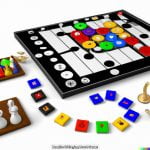Introduction
A board game is any game that involves a physical board and pieces or counters, usually for two or more players. Typically the goal of a board game is to maneuver the pieces, from their starting position on the board through various tasks, to arrive at a final destination. Common examples of this type of game include chess, checkers, Monopoly, battleship and Scrabble.
The benefits of playing board games are numerous. Board games can be educational, teaching basic math and problem-solving skills as well as strategic thinking. Because they involve direct contact with other players, they can also help build social and communication skills. Board games require strategy and rules followings which helps in decision-making and improving critical thinking skills. Moreover, such kind of interactive activities contribute to family bonding moments or just having a great time when playing alone or with peers, since the involvement creates an atmosphere full of joyous laughter. Some researches suggest that cooperative games with high motivational rewards may lead players to increased interaction which promotes stronger relationships between participants even outside the gaming sessions. Additionally, they’re a great way to reduce stress after long hours spent in confined spaces due to their lightheartedness game themes and strategically constructive assignments; this includes workaholics as well as students striving for good grades at college who need some fun based activity now and again
Cognitive Benefits
Board games like chess, backgammon, checkers, and Go provide players with effective cognitive benefits. These logic-based games require extensive strategy, problem solving and planning to be successful ” making them an excellent form of mental exercise for both children and adults. By engaging in these types of board games, players are developing skills such as; decision making, pattern recognition and critical thinking – all vital parts of the human experience. A study from 2015 even concluded that playing board games is a beneficial form of therapy for people dealing with Alzheimer’s or dementia.
Physical Benefits: Increased Movement Benefits Everyone
Playing board games also leads to physical benefits which can help both children and adults alike keep active. Many popular board offers come with trips around the game-board in order to reach certain spaces or tokens ” increasing how much movement is involved throughout the game. Boardgames such as snakes & ladders have the player literally climbing up the ‘ladder’ upon reaching certain spaces on their token ” contributing towards physical activity while having fun! Allowing children extra time to play boardgames not only exposes them to logical challenges but in turn encourages activity levels during otherwise sedentary times!
Social Benefits
Board games are fantastic tools for social interaction and building relationships. The game board itself can act as a kind of shared arena, where players come together and must interact with each other to progress. Not only does this create a sense of community among the members present, but it also encourages dialogue, interpersonal relationships, and skill-building. Empathy is also an important factor in many board games, as players must understand the motivations of others in order to succeed.
The cooperative play that often results from these social interactions can be beneficial for larger groups or families; by working together, everyone can accomplish more than they may have been able to alone. This encourages teamwork and inspires problem-solving skills among those involved in the game. Players learn how to take turns and respect one another, no matter their perspective or tactics when playing. Additionally, it encourages respect for different cultures being represented behind the game boards by incorporating cultural aspects into various themes or storylines.
Board games are not only fun but also offer mental stimulation as well; during gameplay, players have to make tactical decisions on where to invest their limited resources while navigating the rules of the game”enhancing critical thinking capabilities while they’re at it! Furthermore, some board games even reward strategy which helps build strategic thinking skills over time. This leads to better decision making skills off the board too! Playing with other people’s thoughts is beneficial for developing empathy skills because it teaches individuals how to consider others before acting or making decisions. Finally”and possibly most importantly”spending quality time with others creates positive relationships that are essential for overall happiness and success in life.
Emotional Benefits
Board games provide an excellent outlet to tackle any emotions that come up; whether it be the stress or anxiety of a busy lifestyle, or the happiness of shared laughter amongst loved ones. Playing board games with friends and family allows us to take a break from reality and immerse ourselves in a world where fun is the main focus. It also strengthens interpersonal bonds between individuals by providing an environment where adult conversations can take place, while also engaging in a playful competition – fostering physical connection, empathy and understanding.
It has been proven that when humans engage in activities like playing board games they experience increased levels of serotonin – which helps reduce anxiety, depression, aggression and impulsiveness . As we start to become emotionally invested in the game itself and compete alongside those around us, players may find themselves feeling lost within their own emotions as well as those of their peers – potentially leading to heated arguments. This gives us an opportunity to recognize our emotions before acting on them as well as learning how to more effectively communicate through negotiation and compromise.
By playing board games we are able to make positive memories with our friends and family, challenge ourselves intellectually whilst sharing stories and exchanging ideas. In addition, playing monopoly builds financial literacy skills as players learn how to budget money efficiently while still managing wealth accordingly. Ultimately these physical face-to-face social activities promote concerted effort resulting in increased self-esteem; there’s no better way to unite people than over a shared passion!
Physical Benefits
Board games offer an excellent way to develop physical skills. Through hand-eye coordination and the fine motor skills necessary for moving pieces, players can practice the physical agility needed for other activities in life. Board games such as Jenga or Twister require players to navigate the board with skill and grace ” and this helps to fine-tune motor abilities. Strategic board games such as Chess or Checkers offer a great way of improving problem-solving, strategy, and decision-making capabilities while at the same time refining these hand-eye coordination skills. The rapid movements required during some modern board games help children become more agile and enhance their reaction times, especially when playing against a competitor or clock.
Other physical benefits include an increase in spatial perception ” important in everyday life! By engaging with a game’s features and setting, visual awareness vastly improves, making it easier to make decisions quickly. Additionally, board games can even help with developing physical strength; certain dexterity (flicking) games demand fine muscle control that requires significant energy output from both hands and arms; regularly playing them will help give your muscles that extra boost of strength it needs! Finally, Board Games offer up increased engagement with friends: encouraging social interaction helps you move easier too by sweating off those calories through being physically active!
Cognitive Development
Board games can be incredibly beneficial for cognitive development, as they provide players with a unique interactive experience which encourages problem-solving, creativity, and critical thinking. During a board game, players must carefully plan their moves while taking into account their opponents’ strategies to win. They must also think ahead to consider how their decisions will affect the outcome of the game. This helps players develop abstract thinking skills including calculation and logical reasoning. Not only do these skills prepare players for higher education, but they also provide players with a means of communication and understanding among peers in real life situations.
Furthermore, board games require an understanding of one’s own abilities. In order to win at board games, competitors are required to assess their chances realistically in order to come out on top. The ability to accurately identify one’s own strengths and weaknesses is commonly referred to as metacognition – an important tool for students entering college or the workforce. Lastly, board games often involve strategic planning and risk assessment ” something that aids in decision making both inside and outside the classroom setting. Thus, by playing meaningful games such as chess or Monopoly, individuals are able to exercise cognitive muscles which will last well into adulthood!
Imagination Building
Board games are wonderful tools for building up one’s imagination. Not only do board games provide an avenue for players to use their creative powers, but they also encourage the development of new cognitive skills. For example, when playing a game with strategy involved, such as Risk or Civilization, players must think critically and plan ahead if they want to win. This type of imaginative thought process is vital in the development of problem-solving skills and encourages the application of creativity towards real-world situations.
Moreover, board games can help teach cooperation in group settings. Popular cooperative board games, such as Castle Panic or Betrayal at House on the Hill, require players to work together in order to win. As such, these board games contribute to the cultivation of social skills like communication and teamwork; skills that could be beneficial in any professional setting.
Overall, it is clear that board games are great ways to stimulate children’s imaginations and foster important problem-solving and social interaction abilities. Through the creative tasks posed by these activities, children can better equip themselves with the competences necessary to successfully implement their original ideas in life beyond a game board.
Stress Relief
Board games can provide an excellent opportunity to relax and blow off steam. The slow-paced and structured nature of board games can help reduce stress levels as there is a sense of goal setting, concentration and engaging with other players that can distract from negative thoughts and feelings. They also promote positive emotions such as joy, humor and laughter which helps create a more positive atmosphere for people who are stressed out.
Social Bonding: How Board Games Bring People Together
Playing board games together creates an enjoyable social experience where everyone is communicating and cooperating with each other in order to achieve a common goal; it’s not just about the game. This creates invaluable bonding time between family members, friends or colleagues which strengthens relationships by allowing connection over a shared activity. By removing technology from the equation, people are able to communicate more effectively without interruption and listen to one another without distractions.
Exposure To Different Perspectives: How Board Games Promote Dynamic Thinking
Board games naturally encourage creative thinking and prompt solutions by forcing players to think about innovative solutions for problems their characters may encounter. Players get exposure to different perspectives created by their competitors providing an opportunity for learning along the way, making room for improvement which encourages healthy competition within a team dynamic. It also forces players to think more strategically so they can come up with clever ways to win the game.
Concluding Thoughts
Board games have long been a staple in many households. Not only are they a great way to pass the time, but they actually have many benefits that help us take advantage of every moment we have with those around us. These range from improving our mental acuity, enhancing our social skills, and encouraging the development of problem-solving approaches – all while ensuring plenty of laughter!
One of the most beneficial aspects of board games is that they bring people together in a shared physical environment. This offers an opportunity to develop better communication skills and foster closer relationships between friends and family members. For example, cooperative board games like Pandemic require players to actively discuss strategies, share information, listen to each other’s ideas, and work together as a team to accomplish their common goals. It helps participants become more aware not only of themselves but also of those around them”skills which can be applied in everyday conversation and interaction too.
The cognitive benefits that come from playing board games are vast as well. From improved memory recall capacity to increased concentration levels and enhanced problem-solving abilities”board games provide an engaging activity rife with educational opportunities for everyone involved. Moreover, some studies have even linked regular gaming sessions with improved decision making skills which could benefit players during future endeavors (such as taking tests).
Finally, let’s not forget the emotional benefits of board games either! For starters, they provide a much-needed outlet for stress reduction and emotional release; allowing players to often express themselves more openly than “in real life” as it were. Furthermore, strategic games specifically encourage critical thinking ” stimulating one’s creativity along with their aptitude for risk assessment ” both vital interpersonal tools for setting oneself up for success.. Additionally, these kind of activities allow us to ‘recharge’ emotionally by participating in something enjoyable that requires a focus on measurable outcomes rather than potential adverse ones; providing a much needed distraction or break throughout the course of everyday lives.
In conclusion then; regardless of whether you consider yourself an avid board game enthusiast or consider it just part-time hobby at best ” there is no denying the impact this kind of leisure can play in your life! So grab some dice and gather up all your favorite pieces because embracing these classic time tested pastimes can surely bring a plethora rewards you may never have expected!

I love playing all kinds of games – from classics like Monopoly to modern favourites like Ticket to Ride.
I created this blog as a way to share my love of board games with others, and provide information on the latest releases and news in the industry.





